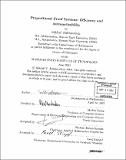Propositional proof systems : efficiency and automatizability
Author(s)
Alekhnovitch, Mikhail, 1978-
DownloadFull printable version (4.959Mb)
Other Contributors
Massachusetts Institute of Technology. Dept. of Mathematics.
Advisor
Madhu Sudan.
Terms of use
Metadata
Show full item recordAbstract
The thesis considers two fundamental questions in propositional proof complexity: lower bounds on the size of the shortest proof and automatizability of propositional proof systems. With respect to the first part, we develop a new paradigm for proving lower bounds in propositional calculus. Our method is based on the purely computational concept of pseudorandom generator. Namely, we call a pseudorandom generator Gn: [0, 1 ] - [0, 1]m hard for a propositional proof system P if P cannot efficiently prove the (properly encoded) statement G (xl,...,xn) f b for any string b [0, 1]m. We consider a variety of "combinatorial" pseudorandom generators inspired by the Nisan-Wigderson generator on the one hand, and by the construction of Tseitin tautologies on the other. We prove that under certain circumstances these generators are hard for such proof systems as Resolution, Polynomial Calculus and Polynomial Calculus with Resolution (PCR). As to the second part, we prove that the problem of approximating the size of the shortest proof within factor 2log1-o(1) is NP-hard. This result is very robust in that it holds for almost all natural proof systems, including: Frege systems, extended Frege systems, resolution, Horn resolution, the sequent calculus, the cut-free sequent calculus, as well as the polynomial calculus. We introduce the Monotone Minimum (Circuit) Satisfying Assignment problem and reduce it to the problem of approximating the length of proofs. Finally, we show that neither Resolution nor tree-like Resolution is automatizable unless the class W[P] from the hierarchy of parameterized problems is fixed-parameter tractable by randomized algorithms with one-sided error.
Description
Thesis (Ph. D.)--Massachusetts Institute of Technology, Dept. of Mathematics, 2003. Includes bibliographical references (p. 135-143).
Date issued
2003Department
Massachusetts Institute of Technology. Department of MathematicsPublisher
Massachusetts Institute of Technology
Keywords
Mathematics.